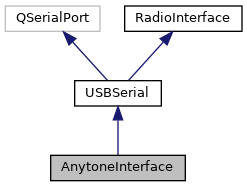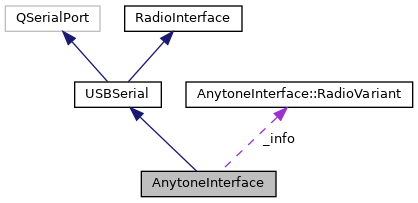Implements the interface to Anytone D868UV, D878UV, etc radios. More...
#include <anytone_interface.hh>


Classes | |
| struct | RadioInfoResponse |
| Structure of radio information response. More... | |
| struct | RadioVariant |
| Collects information about the particular radio being accessed. More... | |
| struct | ReadRequest |
| Binary representation of a read request to the radio. More... | |
| struct | ReadResponse |
| Binary representation of a read response from the radio. More... | |
| struct | WriteRequest |
| Binary representation of a write request to the radio. More... | |
Public Member Functions | |
| AnytoneInterface (const USBDeviceDescriptor &descriptor, const ErrorStack &err=ErrorStack(), QObject *parent=nullptr) | |
| Constructs a new interface to Anytone radios. More... | |
| virtual | ~AnytoneInterface () |
| Destructor. | |
| void | close () |
| Closes the interface to the device. | |
| RadioInfo | identifier (const ErrorStack &err=ErrorStack()) |
| Returns an identifier of the radio. | |
| bool | getInfo (RadioVariant &info) |
| Reads the radio info from the device and returns it. More... | |
| bool | read_start (uint32_t bank, uint32_t addr, const ErrorStack &err=ErrorStack()) |
| Starts the read process from the specified bank and at the given address. More... | |
| bool | read (uint32_t bank, uint32_t addr, uint8_t *data, int nbytes, const ErrorStack &err=ErrorStack()) |
Reads a chunk of data from the block-address bno (block number). More... | |
| bool | read_finish (const ErrorStack &err=ErrorStack()) |
This function ends a series of read operations. More... | |
| bool | write_start (uint32_t bank, uint32_t addr, const ErrorStack &err=ErrorStack()) |
| Starts the write process into the specified bank and at the given address. More... | |
| bool | write (uint32_t bank, uint32_t addr, uint8_t *data, int nbytes, const ErrorStack &err=ErrorStack()) |
Writes a chunk of data at the address addr. More... | |
| bool | write_finish (const ErrorStack &err=ErrorStack()) |
This function ends a series of write operations. More... | |
| bool | reboot (const ErrorStack &err=ErrorStack()) |
| Some radios need to be rebooted after being read or programmed. More... | |
 Public Member Functions inherited from USBSerial Public Member Functions inherited from USBSerial | |
| virtual | ~USBSerial () |
| Destructor. | |
| bool | isOpen () const |
If true, the device has been found and is open. | |
| void | close () |
| Closes the interface to the device. | |
 Public Member Functions inherited from RadioInterface Public Member Functions inherited from RadioInterface | |
| virtual | ~RadioInterface () |
| Destructor. | |
Static Public Member Functions | |
| static USBDeviceInfo | interfaceInfo () |
| Returns some information about this interface. | |
| static QList< USBDeviceDescriptor > | detect (bool saveOnly=true) |
| Tries to find all interfaces connected AnyTone radios. | |
 Static Public Member Functions inherited from USBSerial Static Public Member Functions inherited from USBSerial | |
| static QList< USBDeviceDescriptor > | detect (uint16_t vid, uint16_t pid, bool isSave=true) |
| Searches for all USB serial ports with the specified VID/PID. | |
| static QList< USBDeviceDescriptor > | detect () |
| Searches for all USB serial ports. | |
Protected Types | |
| enum | State { STATE_INITIALIZED , STATE_OPEN , STATE_PROGRAM , STATE_CLOSED , STATE_ERROR } |
| Possible states of the radio interface. More... | |
Protected Member Functions | |
| bool | enter_program_mode (const ErrorStack &err=ErrorStack()) |
| Send command message to radio to ender program state. | |
| bool | request_identifier (RadioVariant &info, const ErrorStack &err=ErrorStack()) |
| Sends a request to radio to identify itself. | |
| bool | leave_program_mode (const ErrorStack &err=ErrorStack()) |
| Sends a command message to radio to leave program state and reboot. | |
| bool | send_receive (const char *cmd, int clen, char *resp, int rlen, const ErrorStack &err=ErrorStack()) |
| Internal used method to send messages to and receive responses from radio. | |
 Protected Member Functions inherited from USBSerial Protected Member Functions inherited from USBSerial | |
| USBSerial (const USBDeviceDescriptor &descriptor, QSerialPort::BaudRate rate=QSerialPort::Baud115200, const ErrorStack &err=ErrorStack(), QObject *parent=nullptr) | |
| Constructs an opens new serial interface to the devices identified by the given vendor and product IDs. More... | |
| QString | formatPinoutSignals () |
| Serializes the pinout singals. | |
 Protected Member Functions inherited from RadioInterface Protected Member Functions inherited from RadioInterface | |
| RadioInterface () | |
| Hidden constructor. | |
Protected Attributes | |
| State | _state |
| Holds the state of the interface. | |
| RadioVariant | _info |
| Holds the radio info. | |
Additional Inherited Members | |
 Protected Slots inherited from USBSerial Protected Slots inherited from USBSerial | |
| void | onError (QSerialPort::SerialPortError error_t) |
| Callback for serial interface errors. | |
| void | onClose () |
| Callback when closing interface. | |
| void | signalingChanged () |
| Signaling callback. | |
Detailed Description
Implements the interface to Anytone D868UV, D878UV, etc radios.
This interface uses a USB serial-port to communicate with the device. To find the corresponding port, the device-specific VID 0x28e9 and PID 0x018a are used. Hence no udev rules are needed to access these devices. The user, however, should be a member of the dialout group to get access to the serial interfaces.
Member Enumeration Documentation
◆ State
|
protected |
Possible states of the radio interface.
| Enumerator | |
|---|---|
| STATE_INITIALIZED | Initial state. |
| STATE_OPEN | Interface to radio is open. |
| STATE_PROGRAM | Radio is in program mode. |
| STATE_CLOSED | Interface to radio is closed (captive final state). |
| STATE_ERROR | An error occurred (captive final state), use |
Constructor & Destructor Documentation
◆ AnytoneInterface()
|
explicit |
Constructs a new interface to Anytone radios.
If a matching device was found, isOpen returns true.
Member Function Documentation
◆ getInfo()
| bool AnytoneInterface::getInfo | ( | RadioVariant & | info | ) |
Reads the radio info from the device and returns it.
The information is only read once.
◆ read()
|
virtual |
Reads a chunk of data from the block-address bno (block number).
- Parameters
-
bank Specifies the memory bank to read from. Usually there is only one bank. Some radios, however, to have several memory banks to hold the codeplug. For example the Open GD77 has EEPROM and Flash memory banks with independent addresses. addr Specifies the address to read from. data Pointer where to store the read data. nbytes Specifies the number of bytes to read. err Passes an error stack to put error messages on.
- Returns
trueon success.
Implements RadioInterface.
◆ read_finish()
|
virtual |
This function ends a series of read operations.
This function will be re-implemented by certain interfaces that need completion of read operations (e.g., HID).
- Parameters
-
err Passes an error stack to put error messages on.
Implements RadioInterface.
◆ read_start()
|
virtual |
Starts the read process from the specified bank and at the given address.
- Parameters
-
bank Specifies the memory bank to read from. Usually there is only one bank. Some radios, however, to have several memory banks to hold the codeplug. For example the Open GD77 has EEPROM and Flash memory banks with independent addresses. addr Specifies the address to read from. err Passes an error stack to put error messages on.
Implements RadioInterface.
◆ reboot()
|
virtual |
Some radios need to be rebooted after being read or programmed.
This function will be re-implemented by some interfaces (e.g., DFUDevice) to reboot the radio. By default this function does nothing.
- Parameters
-
err Passes an error stack to put error messages on.
Reimplemented from RadioInterface.
◆ write()
|
virtual |
Writes a chunk of data at the address addr.
- Parameters
-
bank Specifies the memory bank to write to. Usually there is only one bank. Some radios, however, to have several memory banks to hold the codeplug. For example the Open GD77 has EEPROM and Flash memory banks with independent addresses. addr Specifies the address to write to. data Pointer to the actual data to be written. nbytes Specifies the number of bytes to write. err Passes an error stack to put error messages on.
- Returns
trueon success.
Implements RadioInterface.
◆ write_finish()
|
virtual |
This function ends a series of write operations.
This function will be implemented by certain interfaces that need completion of write operations (e.g., HID).
- Parameters
-
err Passes an error stack to put error messages on.
Implements RadioInterface.
◆ write_start()
|
virtual |
Starts the write process into the specified bank and at the given address.
- Parameters
-
bank Specifies the memory bank to write to. Usually there is only one bank. Some radios, however, to have several memory banks to hold the codeplug. For example the Open GD77 has EEPROM and Flash memory banks with independent addresses. addr Specifies the address to write to. err Passes an error stack to put error messages on.
Implements RadioInterface.
The documentation for this class was generated from the following files:
- /home/hannes/Software/qdmr/lib/anytone_interface.hh
- /home/hannes/Software/qdmr/lib/anytone_interface.cc